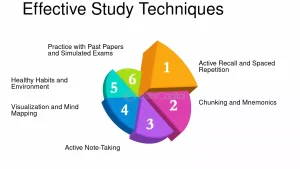
Tips for excelling jamb exams. Being well-prepared and aware of what to anticipate on test day is essential as the JAMB exam draws near. Effective study methods, commitment, and strategic planning are necessary for JAMB (Joint Admissions and Matriculation Board) exam preparation. We’ve put up a list of crucial information you should be aware of before to taking the JAMB exam in order to boost your confidence and prepare you for the big day.
TIPS FOR EXCELLING JAMB EXAMS
The Joint Admissions and Matriculation Board (JAMB) examination is a critical milestone for students in Nigeria seeking admission into tertiary institutions. Excelling in the JAMB examination requires thorough preparation, strategic planning, and effective study techniques. This article offers a comprehensive guide to help students navigate the challenges and excel in the JAMB examination.
1. Understanding the JAMB Examination

The JAMB examination typically consists of multiple-choice questions covering subjects such as English Language, Mathematics, Sciences, Social Sciences, and Arts. It assesses candidates’ knowledge, comprehension, and reasoning abilities. Understanding the exam format, syllabus, and marking scheme is essential for effective preparation. Make sure you learn how to answer the CBT questions, how to login into your portal and use the computer.
2. Create a Study Plan
Developing a structured study plan is essential to cover the extensive syllabus comprehensively. Allocate specific time slots for each subject, focusing on weaker areas while also revising stronger ones. Break down the syllabus into manageable sections and set realistic goals for each study session.
3. Utilize Official JAMB Resources
JAMB provides official study materials, including syllabus, past questions, and recommended textbooks. Utilize these resources to familiarize yourself with the exam format, question types, and syllabus coverage. Practice solving past questions under timed conditions to improve speed and accuracy.
4. Implement Effective Study Strategies

Employ active learning techniques such as summarizing notes, creating flashcards, and practicing with mnemonic devices to enhance retention. Engage in regular revision to reinforce learning and identify areas that require further review. Collaborate with classmates or study groups to exchange ideas and clarify concepts.
5. Stay Informed
Keep abreast of updates and announcements from JAMB regarding exam dates, registration procedures, and syllabus revisions. Familiarize yourself with the JAMB examination policies and guidelines to avoid any pitfalls during the registration and examination process.
6. Practice Time Management

Tips for excelling jamb exams
Time management is crucial during the exam to ensure that you complete all sections within the allocated time. Practice answering questions under timed conditions to improve your speed and efficiency. Prioritize questions based on difficulty level and allocate time accordingly.
7. Stay Healthy and Relaxed
Maintaining a healthy lifestyle is essential during the exam preparation period. Get adequate rest, exercise regularly, and eat nutritious meals to stay energized and focused. Avoid excessive stress and anxiety by practicing relaxation techniques such as deep breathing and mindfulness.
8. Exam Day Strategies

Tips for excelling jamb exams
On the day of the exam, arrive early at the examination center to avoid any last-minute rush. Bring all required stationery, identification documents, and examination materials. Read instructions carefully and manage your time effectively during the exam. Stay calm, focused, and confident in your abilities.
Summary
Success in the JAMB examination requires dedication, perseverance, and effective study strategies. By understanding the exam format, creating a structured study plan, utilizing official JAMB resources, and implementing effective study techniques, students can maximize their chances of success. Remember to stay informed, stay healthy, and stay focused on your goals. With proper preparation and determination, success in the JAMB examination is attainable.